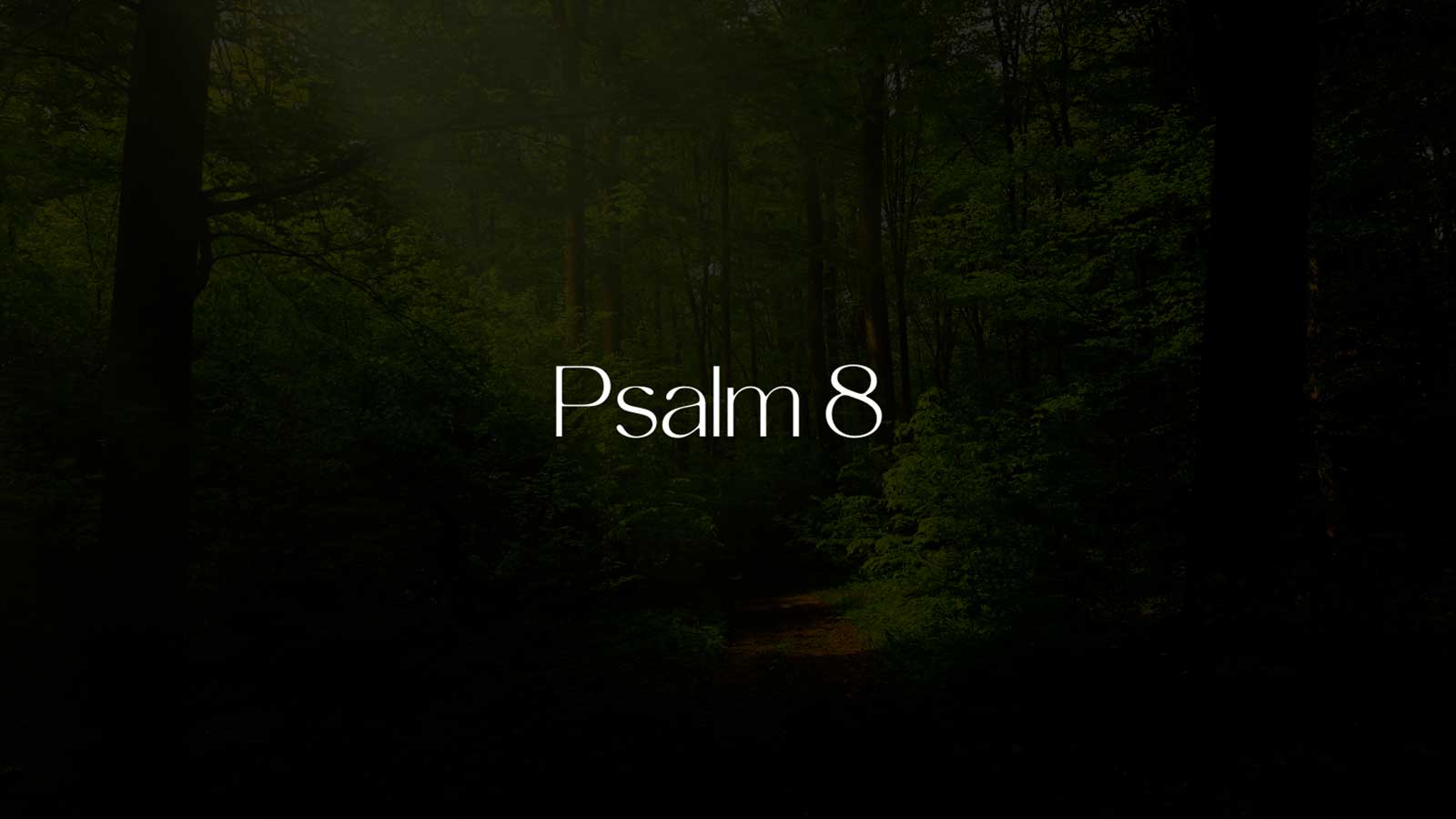The Psalm 8 is one of the most beautiful and profound texts in the Book of Psalms. It leads us to a sincere reflection on the greatness of God and the role of human beings in the universe. From the very first verses, we are guided to contemplate creation with reverence while also recognizing God’s care in every detail of existence.
In this article, we will explore the meaning of Psalm 8, understand what it teaches us, discover how to apply it in daily life, and delve into its timeless truths. All of this is presented in simple, accessible language full of spiritual significance.
Complete Psalm 8
1 O Lord, our Lord, how majestic is your name throughout the earth, for you have set your glory above the heavens!
2 You have commanded strength from the mouths of infants and nursing children, because of your enemies, to silence the foe and the avenger.
3 When I behold your heavens, the work of your fingers, the moon and the stars you have prepared;
4 What is man that you are mindful of him, and the son of man that you care for him?
5 Yet you have made him a little lower than the angels, and crowned him with glory and honor.
6 You have given him dominion over the works of your hands; you have placed all things under his feet:
7 All the sheep and oxen, as well as the beasts of the field,
8 The birds of the heavens, and the fish of the sea, and everything that passes along the paths of the seas.
9 O Lord, our Lord, how majestic is your name throughout the earth!
What Psalm 8 Reveals About God
Psalm 8 begins and ends with a powerful affirmation: the name of the Lord is magnificent throughout the earth. This reveals the all-encompassing nature of divine glory, which is not confined to any specific place, time, or people. Praise for God overflows into all of creation, echoing in every detail of the world around us.
When speaking of the moon, the stars, and the heavens, the psalmist highlights the divine work as something majestic and intricate. In Psalm 8, creation is a direct expression of the Creator’s greatness. It points to a God who is careful, organized, and intentional—nothing is random; everything has a purpose.
Even the sound of children’s voices is seen as something that glorifies God. This demonstrates that He works through purity and simplicity. Elaborate words or great deeds are not necessary to praise the Lord. Psalm 8 teaches us that even the smallest gestures and the most innocent voices can exalt the Creator.

Verse-by-Verse Explanation of Psalm 8
Psalm 8 is an incredibly rich text, and understanding each verse individually helps deepen its message. Below, we analyze each part of the psalm with an accessible explanation full of spiritual meaning.
Verse 1
O Lord, our Lord, how majestic is your name throughout the earth, for you have set your glory above the heavens!
This opening verse sets the tone for the psalm. David acknowledges that God’s name is magnificent throughout the earth. The term “majestic” highlights the greatness of God’s character. His glory is not confined to a specific location but extends over the heavens, demonstrating that He is above all.
Verse 2
You have commanded strength from the mouths of infants and nursing children, because of your enemies, to silence the foe and the avenger.
At this point, the psalmist reveals that even the weakest voices—such as those of babies—are capable of manifesting God’s strength. This shows that divine authority does not depend on human power. God uses the simple and the small to silence those who oppose Him. It is a powerful image of how purity is valued by the Lord.
Verse 3
When I behold your heavens, the work of your fingers, the moon and the stars you have prepared;
Here, David expresses his contemplation of nature. He gazes upon the sky and recognizes that all of it—the moon, the stars, the heavens—is the work of God’s hands. By describing it as “the work of your fingers,” he conveys the idea that God is a meticulous artist, detail-oriented and the creator of unparalleled beauty.
Verse 4
What is man that you are mindful of him, and the son of man that you care for him?
By comparing the greatness of the heavens with the smallness of humanity, David wonders why God would care about us. He acknowledges that man is fragile, fleeting, and limited. Even so, God not only remembers him but also visits, watches over, cares for, and relates to him. This verse reveals humility and admiration in the light of divine love.
Verse 5
For you have made him a little lower than the angels, and crowned him with glory and honor.
Despite human frailty, God has bestowed immense value upon man. This verse states that man was made a little lower than the angels but was crowned with glory. It shows that, in God’s eyes, humanity possesses a special dignity—a dignity granted not by merit, but by divine love and purpose.
Verse 6
You have given him dominion over the works of your hands; you have placed all things under his feet:
God has entrusted humanity with responsibility over creation. This verse shows that man has authority over the created world, but that authority is meant for stewardship rather than abuse or cruel domination.
Verse 7
All the sheep and oxen, as well as the beasts of the field,
Now, David begins to detail what is entrusted to human care. He mentions domesticated animals, such as sheep and oxen, as well as the wild animals that roam the fields. This illustrates the vast scope of creation placed under human stewardship.
Verse 8
The birds of the heavens, and the fish of the sea, and everything that passes along the paths of the seas.
Man’s authority also extends to the heavens and the seas. Birds and fish represent living beings from diverse environments. This verse reinforces that all of creation was entrusted to human care, implying a commitment to preservation rather than destruction.
Verse 9
O Lord, our Lord, how majestic is your name throughout the earth!
The final verse repeats the psalm’s initial declaration. This creates a literary frame where everything is enveloped in the worship of God. The psalm begins and ends with the recognition that the name of the Lord is magnificent, reinforcing that God’s glory is eternal, universal, and worthy of recognition by all.
The Smallness of Man in the Face of the Universe
One of the most striking moments in Psalm 8 is when David, gazing at the starry sky, questions the significance of human beings. He wonders why God would remember man, who is so small in the vastness of creation.
This question still resonates today. In a world where we often feel lost, insignificant, or overwhelmed, Psalm 8 offers comfort and guidance. It reminds us that, even though we may seem small, we are remembered by God—a truth that both consoles and fills us with purpose.
The Value of Human Beings According to Psalm 8
Despite our apparent smallness, human beings receive a place of honor from God. Psalm 8 declares that man was made a little lower than the angels and crowned with glory and dignity, showing just how valuable each person truly is.
This statement carries profound meaning. God not only created us but also endowed us with value, authority, and responsibility. From this perspective, we understand that our existence is not by chance—every life matters, and each person bears the mark of the Creator.
Psalm 8 invites us to view ourselves and others with greater compassion and respect. In times when human identity is constantly questioned, this message is more relevant than ever.

Human Dominion Over Creation
Another important aspect of Psalm 8 is the role God grants humanity over creation. The text states that everything has been placed under our feet: the animals of the earth, the birds of the sky, and the fish of the sea. This is not an endorsement of exploitation but a call to responsibility.
Being responsible for creation involves care, respect, and mindful stewardship. Psalm 8 reminds us that God has entrusted us with the mission of preserving the world He made—a task that requires balance, wisdom, and sensitivity.
In an era when sustainability and environmental concerns are frequently discussed, this lesson from Psalm 8 becomes even more relevant. Caring for the planet is also an act of worship to the Creator.
Psalm 8 and Its Connection with Jesus
Psalm 8 is not only a celebration of creation but also carries a prophetic significance. In the New Testament, especially in the Book of Hebrews, this psalm is cited as a direct reference to the person of Jesus Christ.
The expression “Son of Man,” used in Psalm 8, is one of the titles Jesus most often used to refer to himself. By being made “a little lower than the angels,” Jesus identifies with humanity. He lived among us, shared our sorrows, and conquered death, ultimately assuming dominion over all things.
Therefore, Psalm 8 points to God’s redemptive plan. It shows that even in the face of human fallenness, there is a path to restoration through Christ. This broadens the psalm’s meaning, making it not just a song of praise but also a messianic prophecy.
Practical Applications of Psalm 8 in Daily Life
Psalm 8 is not only beautiful to read—it is meant to be lived. Its words inspire us to live more consciously and connected to God. Here are some ways to apply it in everyday life:
Cultivate gratitude:
By recognizing the beauty of creation, we are led to give thanks. Psalm 8 teaches us to value the small wonders around us.
Care for nature:
If we have been appointed as stewards of the Earth, we must act responsibly. Preserving the environment is also a way of obeying God’s call.
Value human life:
Every person is a masterpiece of the Creator. Psalm 8 invites us to respect and love our neighbors, recognizing their inherent worth.
Live with purpose:
Knowing that God created us with honor and glory motivates us to seek a higher purpose in all that we do.

Why Does Psalm 8 Remain So Relevant?
Amid the rapid advancement of technology, social media, and a fast-paced life, Psalm 8 continues to resonate powerfully. It invites us to pause, contemplate, and remember what is truly essential: the majesty of God and our role as part of creation.
Many today live a life without clear direction, seeking approval, status, or recognition. Psalm 8 reminds us that true value is not found in what we possess, but in who we are to God. We are remembered, loved, and empowered by Him.
How to Memorize and Meditate on Psalm 8
Memorizing Psalm 8 is a powerful way to keep the Word of God alive in your heart. Here are some practical suggestions:
- Read the psalm aloud every morning.
- Divide the psalm into sections and focus on one per week.
- Write down the most striking verses and post them in visible areas of your home.
- Use an app to listen to the psalm while you attend to your tasks.
By repeatedly reciting Psalm 8, its words become part of who you are. It begins to shape your worldview and strengthen your faith.
Curiosities About Psalm 8
- Psalm 8 is one of the few psalms that begins and ends with the same phrase, reinforcing the idea that everything revolves around the glory of God.
- It is considered a psalm of universal worship, as it encompasses all of creation—from the heavens to the animals of the earth.
- In some Bible versions, a musical instruction “to the tune of the Gitite” appears, indicating that it was likely sung with a specific melody.
These details show how Psalm 8 was used in worship and how its message continues to touch hearts.
The Most Impactful Verses of Psalm 8
Some passages in Psalm 8 stand out in a particularly profound way. They are simple yet carry deep spiritual significance:
- The recognition of God’s glory throughout the earth.
- The question regarding the value of man in the face of creation.
- The statement that human beings were crowned with honor and glory.
- The declaration that everything has been placed under man’s feet.
Each of these phrases can serve as a starting point for a prayer, reflection, or personal study.
Lessons That Psalm 8 Teaches Us
Throughout the text of Psalm 8, we can draw powerful lessons:
1. God is great and worthy of praise.
Nothing compares to His majesty. All of creation points to Him.
2. Creation is an expression of divine glory.
The world around us is not a product of chance, but a manifestation of God’s wisdom.
3. Human beings have a special role.
We were created with dignity to care for creation and live in communion with the Creator.
4. Humility is essential.
Even though we are small, we are remembered by God, which calls us to acknowledge our place with gratitude and reverence.
FAQ: Common Questions About Psalm 8
Who does Psalm 8 speak about?
It speaks about God, creation, and human beings, showing the relationship between the Creator and the creature.
What is the main theme of Psalm 8?
The majesty of God and the honor bestowed upon man within creation.
On what occasions is Psalm 8 used?
It can be used in moments of worship, prayer, Bible studies, and personal reflections.
Is there a connection between Psalm 8 and Jesus?
Yes. In the New Testament, it is cited as a reference to Christ as the “Son of Man.”
What is the best way to apply Psalm 8 today?
By living with purpose, caring for creation, and recognizing the value of every life.
Conclusion
Psalm 8 is an invitation to contemplation, a call to responsibility, and a celebration of human dignity. It reminds us that, even in the vastness of the universe, we are seen, remembered, and honored by God.
May this psalm lead us to live with greater awareness, gratitude, and purpose. May we recognize the glory of the Lord in every detail of life and joyfully embrace the role He has entrusted to us. Psalm 8 is more than an ancient poem—it is a living truth for our times.
READ ALSO:
- Hail Mary Prayer: Latin Version and For Printing
- Verse about Missions: The Call of God
- The Power of Prayer + 10 Prayers
- Love Quotes: The Transformative Power of Love
- Isaiah 43:1-13 – Detailed Explanation
FOLLOW US ON FACEBOOK
I hope you enjoyed it.